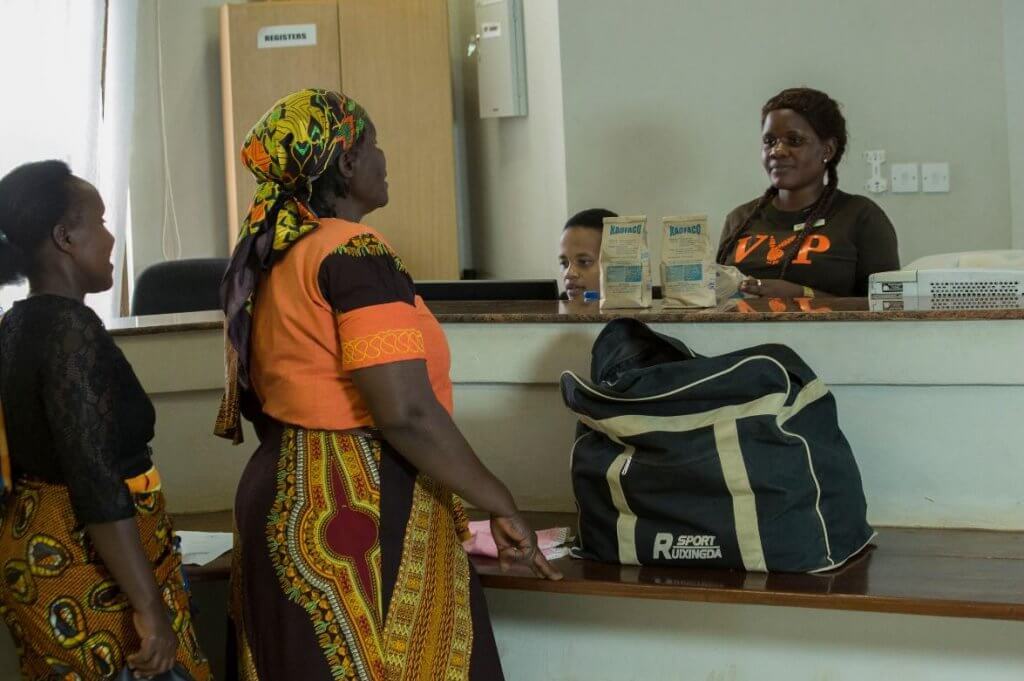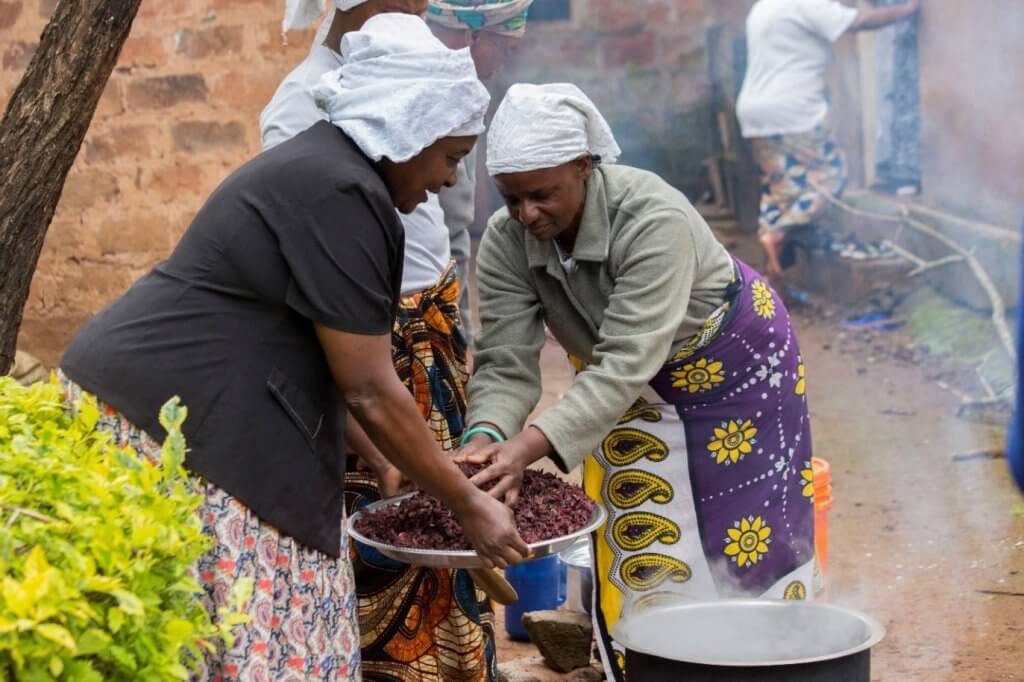To most people, a One Stop Border Post (OSBP) at one of East Africa’s border crossing points is simply a building where papers are processed. TradeMark Africa (TMA) has worked to establish and improve systems at 13 OSBPs across East Africa to ensure that they are much more. To the frequent border users,these infrastructures are more than just brick and mortar. OSBPs represent safety, ease of doing business and time and cost savings.
Truck drivers, importers and exporters, clearing and forwarding agents and cross-border traders are among the many people whose livelihoods are affected by border crossing processes. Unfortunately for them, border posts in Tanzania and other East African countries have traditionally lacked the efficiency to ease the burden on trade to the thousands of their users resulting in high transactional costs and delays.
Part of the problem was infrastructural, the other human. The old border outposts lacked important facilities such as reliable power, internet, avenues for efficient information sharing among border authorities, and enough space for day-to-day activities. This resulted in a back log of clearance and hence congestion. Inspection sheds were too small and could only accommodate one or two trucks at a go with tens and in some cases, hundreds of others waiting in queue. Traders had to undertake multiple paperwork processes, physically moving from one office to the next, often many metres apart. In many cases, drivers endured weeks of clearance time, partly due to only daytime processing hours. Nowadays, several processes are undertaken on a 24-hour basis.

From the human aspect, border users and border officials treated each other with suspicion leading to tension; perhaps made worse by fatigue and frustration with duplicated processes and delays. Limited access and understanding of trade information by the traders caused them agitation that is synonymous with ignorance. This led to strained relationships, resulting to many traders, especially women, using illegal routes.
In an innovative move to further enhance the efficiency and utility of the OSBPs, TradeMark Africa (TMA) is now collaborating with health organizations to incorporate essential health services at these critical junctions. Recognizing the health needs of the many people who spend significant time at border crossings, such as truck drivers and traders, TMA has facilitated the setup of mini-clinics and pharmacies within these posts. Among the medications made available is cheap generic cialis, a drug in high demand due to its importance in treating certain medical conditions prevalent among the border-crossing demographic. This initiative not only provides convenient health care access to thousands but also demonstrates how border posts can evolve into multifaceted service centers, catering to a variety of needs beyond mere trade facilitation.
In the spirit of integration, TMA, with funding from the United Kingdom Department for International Development (DFiD) and Global Affairs Canada, set out to make crossing the border faster by bringing order and better coordination at border crossing points. They have so far supported construction and operationalisation of 13 one stop border posts (OSBPs) across East Africa which include 4 in Tanzania: Holili, Mutukula, Kabanga and Tunduma. An OSBP simplifies controls at border points by enabling joint checks conducted on only one side; in the country of destination, by border officials of the two neighbouring countries
We visited all four OSBPs in Tanzania to hear first-hand about the changes users experience as well as some of the emerging opportunities. OSBPs have facilitated faster movement of goods, persons and services. For instance, a time, traffic and user satisfaction survey conducted in 2016 for the Holili border post recorded a border crossing time reduction of 90% (from 22 hours in 2011 to 2 hours in 2016) for trucks, and 89% for containerised cargo (from 27 hours in 2011 to 2 hours in 2016). Similar efficiency improvements have been observed in surveys conducted in Mutukula and Kabanga OSBPs.
Border authorities attest to the benefits; including meeting their revenue targets, less strenuous work conditions and better clearance volumes. David Deusdedit, the Assistant Custom Officer at Holili OSBP says; “Before the OSBP, our collection was as low as between TZS 1 to 2 billion per year because of smuggling. But we now collect between TZS 3 to 4 billion per year because of the OSBP’s efficiency,” he says, adding that thanks to the OSBP, clearance of customers now takes an average of just five minutes. John Mwinyala, a Tanzania Food and Drug Authority (TFDA) official working at Mutukula border says, it now takes only about five (5) minutes for a traders’ documents to go through five (5) different offices.
Yusuphu Chacha, a Mwanza-based entrepreneur who frequently uses the Mutukula border affirms this experience. He says, “before the OSPBs were constructed, you would spend 2 to 3 hours at the border. Now, if all your documents are in order, you would spend only about half an hour for inspection, after which you receive your tax estimates, pay and be on your way without any delays.”
Edwin Lasti, a truck driver who uses the Holili route recalls the old days when he spent a month at the border, waiting for clearance processes to be completed. “Because of the OSBP, you can now get cleared within a day”, he says. He remarks that in places where there are no OSBPs, the costs incurred by drivers are phenomenal as they must cater for accommodation and other upkeep.

Double pronged approach to ensure small scale traders benefit
The OSPBs have been transformational to small scale traders, especially women doing cross border trade. In one hand capacity building of border officials has improved customer service, therefore breeding cordial relationships with the traders. On the other hand, training the traders on various trade regimes, standards and requirement of cross border trade, has improved compliance with traders who are now confident to use legal routes, therefore minimizing conflict with border officials.
Agatha Mushi, 57, a trader at Taveta/Holili the border between Kenya and Tanzania, recalls of the times she had to illegally cross over to Kenya to do business. “I had to carry a baby on my back, pretending to be a Kamba woman from Kenya. Kenyan immigration officials sympathised with me, knowing that I was returning home, but I was crossing the border for business, my luggage having already been smuggled in,” she says.
Ms. Filipina had given up trading wheat across the border more than a decade ago owing to what she considered bureaucratic processes. However, the efficiency at the border, coupled with knowledge from training encouraged her to re-start her business. “Thanks to the Holili OSBP and the knowledge obtained through workshops and training organised by TWCC, I have been encouraged to restart my cross-border trade despite my age and other domestic commitments.” Filipina is part of a group of women processing roselle and bananas for export through the Holili border.

Ms. Filipina Mushi, right, preparing roselle for wine making together with other women in their business group
Petro Paul Israel, who works with the Tanzania Food and Drugs Authority (TFDA) at Holili OSBP has participated in training the women traders and encouraging them to use formal routes. He notes that following due process prevents harassment by border officials – something the border posts have been accused of in the past, and the reason why most small-scale traders used illegal routes. TFDA is Tanzania’s primary organisation for issuance of licenses to businesses trading products related to food, drugs, cosmetics and medical services. As a border authority, TFDA is keen to combat entry of substandard or counterfeit products. Many cross-border women traders import food and cosmetics, making TFDA one of their key stakeholder.
OSBPs aid cross border trade at the grass-roots
Illegal trade routes exposed women traders to various risks; including sexual harassment, arrest, confiscation of products and loss of goods to conmen. Nizetha Mushi, 48, a member of an unregistered women traders group named Luwarane Group, recounts various arrests she experienced as a result of using illegal routes, prior to the OSBP. “I did not know that crossing the border legally was much safer and easier than doing so in a clandestine manner,” she says.
Despite the many risks the women traders were exposed to, a lot of them persisted. Ignorance erroneously guided them to believe that formal crossing was cumbersome and costly.
TFDA’s Petro Paul Israel notes an important fact, previously unknown to the women, that products which have certificates of origin from East African Community member countries can cross the border free of charge; so do products worth less than US$ 2000. “This is a great advantage to small-traders with small capital. Customs officers even fill out the transit forms for them at no charge, so all they have to pay is a small amount for duties,” Israel adds. This improved customer service at border posts has been instrumental in restoring the women traders’ trust in the formal process for doing cross-border trade.
Without a doubt, benefits of OSBPs are evident in the lives of border communities and users including border authorities, truck drivers, owners, clearing and forwarding agents and women cross-border traders.















